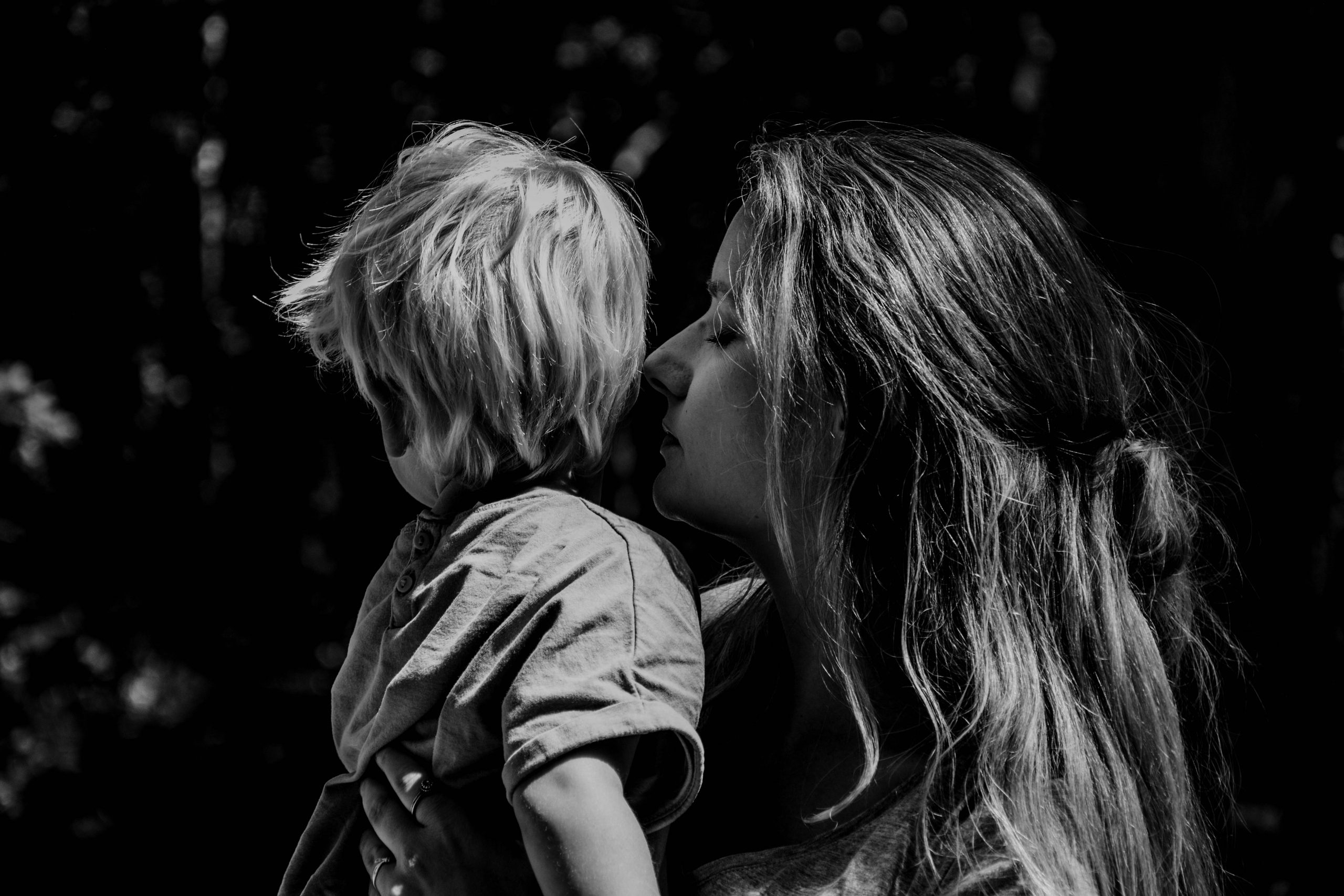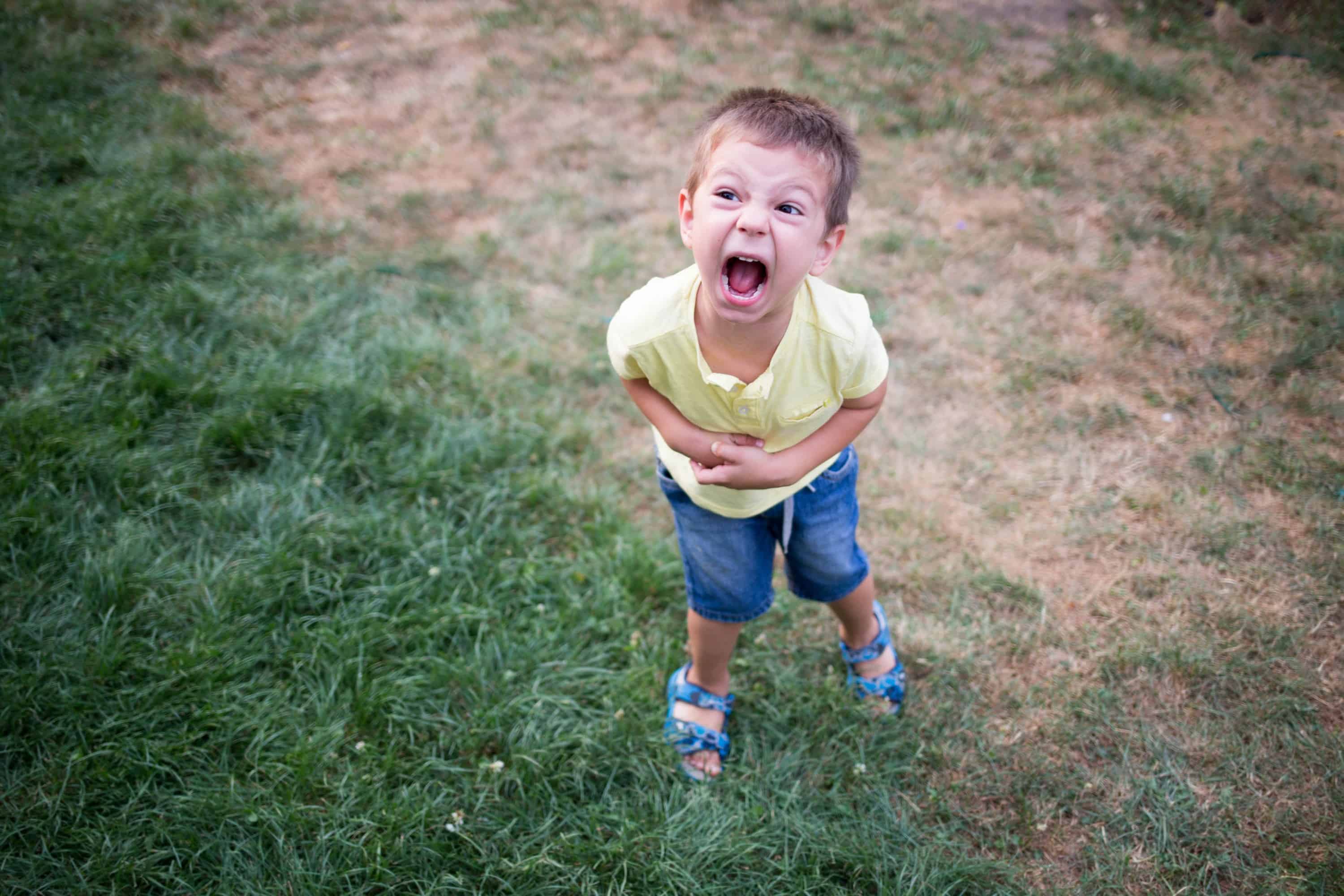Should you punish tantrums and emotional outbursts in kids? Find out how research says you should face meltdowns, rude outbursts,…
Should you punish a toddler meltdown or emotional outbursts in young children? Find out what research says to effectively stay calm through meltdowns, crying, and tantrums. Find out how to coach children through meltdowns without being permissive.
With two young children fifteen months apart, some days, it feels like I’m walking through an emotional minefield. Toddler tantrums are an ever-present threat, and I’m never sure what little things will set my young children off and make them feel angry. When they were younger, a diaper change was often cause for angry outbursts. Now that they are older, almost anything is fair game to trigger tantrums.
For example, in the food court at the mall, my strong-willed daughter had a temper tantrum because her bagel didn’t have enough cream cheese. Then, my sensitive son had a toddler meltdown in the parking lot after grocery shopping because I undid his car seat when he wanted to do it himself. See what I mean about little things? Sometimes I wonder if my kids even know what good behavior is!
 I was tired, and two back-to-back meltdowns in public places had left me with little self-control, and I was struggling to stay calm. In moments like these, I struggle not to make a big deal out of my child’s tantrums. Tantrums pass, but still, I often feel angry and like I’m losing it, and I battle to control my own frustration and stay calm.
I was tired, and two back-to-back meltdowns in public places had left me with little self-control, and I was struggling to stay calm. In moments like these, I struggle not to make a big deal out of my child’s tantrums. Tantrums pass, but still, I often feel angry and like I’m losing it, and I battle to control my own frustration and stay calm.
Angry outbursts are a normal part of life for us at the moment…and I’m not just talking about my young children. Toddler tantrums have a way of triggering my own feelings and testing my self-control and capacity for empathy. As much as I want to stay calm, this second year of parenting (you know, the one with toddlers) is proving more challenging than I anticipated. Good behavior is hard to come by these days, and I’m just as guilty as my kids.
Related reading: Positive Parenting Strategies for Difficult Toddler Behaviour
In those moments when I need to get the grocery shopping done or all eyes are on me, it can feel especially tempting to punish tantrums and emotional outbursts. A toddler meltdown always seems to happen at the worst time!
I mean, I don’t want to raise kids with no self-control who have temper tantrums at the drop of a hat.
Even if I’m in the privacy of my home, dealing with my child’s behaviour in certain situations can feel impossible. The last thing I want is to reinforce bad behavior and let my young children think that temper tantrums are an effective way to get what they want.
Who wants a child who thinks it’s okay to scream when his toast is cut incorrectly or a daughter who throws a doll that isn’t easy to dress?
The truth is, no one does.
But my response to their emotional dysregulation isn’t helpful either. My go-to response to temper tantrums is getting mad. I shout, and I cry, and my body language tells my kids that I am no longer a safe place for them to turn to. I have my own version of a toddler meltdown. Kids learn from what they see modeled for them. If I can’t stay calm and regulate my own emotions, how can I expect my very young children to do the same?
But should you give in to your toddler’s tantrums? What about your older children?
In the heat of the moment, the most important thing to handle tantrums might seem like placating them to make your child’s tantrum stop. A toddler tantrum is a fearsome thing and strikes fear into the hearts of most parents. But kids learn quickly that temper tantrums can be an effective way of wearing you down.
Permissive parents tend to avoid discipline or addressing their child’s behavior in the interest of avoiding confrontation and more tantrums in the short term. It may seem effective, but it’s not the best way to handle tantrums. They want to create a safe place for their kids, but children feel safest when they have consistent and firm boundaries. Unfortunately, in the long term, this style of parenting leads to children who have poor self-discipline and little emotional regulation.
Children with permissive parents tend to be more rebellious and defiant. Older children may have lower persistence and more antisocial behaviors when compared to their peers.
But if you aren’t supposed to give in to the temper tantrum, should you punish it instead? No. A toddler tantrum is your child’s way of telling you something.
The answer to permissiveness isn’t punishment. You can’t prevent tantrums by adding to your child’s dysregulation.
Related reading: This is the Crucial Difference Between Positive and Permissive Parenting

Research shows that how we react to our children’s emotional outbursts or challenging behavior predicts how well they will cope with these same emotions in the future. Young children are in a tricky stage of child development. They learn how to experience and react to emotions in a positive way from our reactions. We have to validate their emotions and praise positive behavior instead of focusing on negative actions. The first place you can start is learning more about positive discipline.
The first year of parenting is hard, but I think the second year may be harder. Older children require a new level of patience, compassion, and empathy because they are trying to assert their independence and learn about the world around them. It’s easy to lash out and punish them for big displays of emotion. But there are other ways to prevent tantrums.
Tantrums are a normal part of childhood. But that doesn’t mean we should let our children’s temper tantrums go unaddressed. And punishment doesn’t work the way we want it to.
So, what is the answer to help young children have fewer tantrums?
This can be especially challenging, especially when we feel rushed, pushed to our limits, or out of resources. However, parents who stay calm have the greatest success when mediating a temper tantrum.
For example, say, “You’re upset. That’s hard.” This lets them feel heard and lets them know you are a safe place for them when they are struggling with big feelings.
As a result, children feel empowered to move on because you haven’t dismissed or minimized their feelings. Using the bagel example, I tell my child it’s okay to be frustrated. It’s hard not getting exactly what she wants. At the same time, she can’t throw the bagel away.
A temper tantrum is often an outward display of internal dysregulation, which is a perfectly normal part of child development. But we can help our kids learn how to cope with their feelings in a healthy way, which will mean fewer tantrums.
You may be able to prevent tantrums if you can identify common tantrum triggers. Now, the idea isn’t to avoid these triggers, but you can help your child prepare for them and manage their emotions.
Redirecting behavior can be a helpful way to manage a strong-willed child. Again, with the bagel example, this would be something along the lines of, “Do you want more cream cheese? All you need to say is, ‘More cream cheese please?’” Then wait for them to comply. You can also encourage a non destructive way to deal with their feelings. Praising good behaviour is another effective way to encourage fewer tantrums. Remember, good behavior is learned behavior.
If their temper tantrum is more about raw emotion than an actual event, there are wonderful strategies for calming older children that can be found here.
Related reading: The Whole Brain Child – The neuropsychology behind why addressing the child’s feelings first, then disciplining, is one of the best ways to handle emotions.
If children are struggling to regulate, a time-in or a time-out can help greatly. When my children can’t compose themselves, and we are able to, I take whoever is struggling to his/ her room or to the side of the interaction. I stay close to my daughter. My son needs space, so I tell him I’m available when he needs me.
Sometimes, emotionally overwhelmed kids need nap time, particularly if they are very young. You can spend your time out reading a story, or you can give them a massage. The deep pressure of a message can help calm their nervous system and prime them for a restorative nap time.
Staying calm and taking the time to pause before engaging with your child is a great way to prevent a power struggle during temper tantrums. Almost anything can trigger tantrums, and your child needs you to empathize with them, not assert your own ideas into the situation. Wait until they are calm enough to listen to your words. In some situations or with some kids, that might be right away. For others, this could be a much longer process. All you can do is wait.
Children feel more connected to us and more secure when they are hugged in times of intense emotion.
Research on responsive parenting shows this approach is the most powerful way for children to better regulate their emotions in the short term and show more appropriate responses in the long term. Good behaviour happens when kids feel good about themselves and are connected to us.
Learning to deal with big emotions is challenging, even for adults. I feel angry often and sometimes feel like throwing a tantrum myself. With three kids under the age of six, I’m likely to face a few more seatbelt debacles and food court meltdowns. Unfortunately, there are no magic bullet tantrum tips or discipline miracle cures that will prevent tantrums.
But, by coaching rather than punishing my kids for their emotions, they are learning to express themselves more appropriately and manage their feelings better. Good behaviour happens when kids feel seen, heard, and respected. Learning how to handle temper tantrums more effectively can go a long way in raising resilient kids.
Bad Parenting: What To Look For and How To Change It
20 Tips on How To Be A Good Mom – The Easy Way
Front-Loading, Redirection & Connection: 3 powerful strategies for your strong-willed toddler
This is the Crucial Difference Between Positive and Permissive Parenting
Highly Sensitive Child Challenges: Supporting Your Child
Ask any parent who has watched a two‑year‑old “fail” to hear the call to put on shoes—only to…
Toddlers can be confusing, to say the least. One moment they’re clinging to your leg like a baby…
Affection wasn’t really a thing in my childhood home. My parents were good providers, but hugs, “I love…